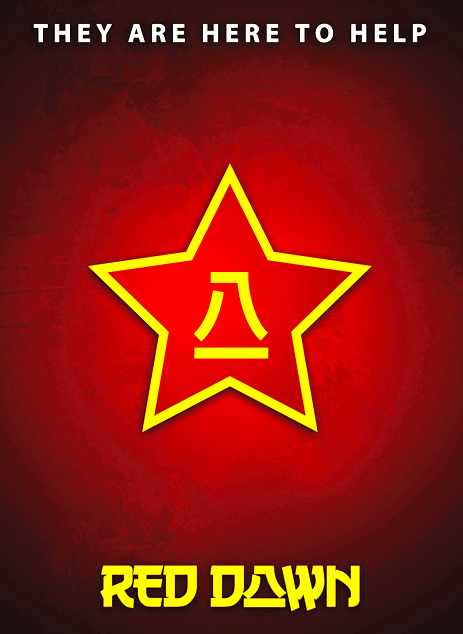
By Jason Apuzzo. Last August, Libertas was the first and only media outlet invited to see MGM’s new version of Red Dawn, a remake of the original 1984 film written and directed by John Milius. We were invited to see the film by MGM executives due to our ongoing coverage here at Libertas of pro-freedom films – and of our coverage of the many recent films specifically dealing with the subject of communism (Salt, Mao’s Last Dancer, Farewell, Peter Weir’s recent The Way Back). Red Dawn screenwriter Carl Ellsworth was in attendance at our screening.
We postponed commenting on Red Dawn until this time due to the complex and delicate situation at MGM, and also due to the fact that the film as yet has no release date. MGM is under new management, however, and recently the LA Times broke the story that the film – which features the communist Chinese invading the mainland U.S. – is currently being re-edited and digitally altered by MGM’s new management team in order to make North Korea into the primary invading force. References to the Chinese military are, according to the LA Times, being minimized wherever possible. The film has apparently become a political hot potato, with MGM looking to sell the film – or perhaps not release it at all.
We had been aware since last August that this was a possibility, in so far as the Chinese market represents a highly lucrative one to American film distributors – and that China would likely penalize any company distributing this new Red Dawn. It now appears that the fears expressed to us at the time by several MGM executives are becoming a reality, and that the film is, in effect, being politically censored due to pressures coming from potential distributors.
Needless to say, we find this kind of political re-editing of a film appalling – as well as unprecedented. In the case of Red Dawn, it’s also perversely ironic, in so far as the basic premise of the film involves the Chinese invading American in order to ‘collect’ on an economic debt America owes to them – a debt that in the real world, as it turns out, China will now be ‘collecting’ by MGM’s film simply being re-edited.
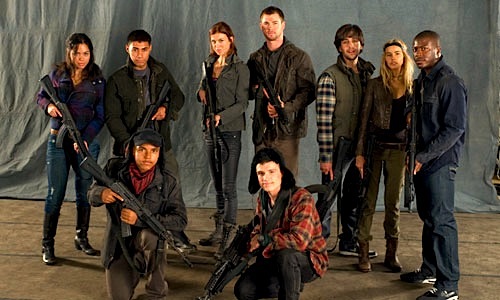
As a further note, there is a certain racist crudeness in equating Chinese with Koreans (i.e., ‘Asians all the look the same’) of which MGM seems unmindful.
Here at Libertas we are committed to positively promoting films that celebrate freedom, democracy, and the dignity of the individual. Of late, for example, we’ve promoted a whole range of dissident, ‘D-Generation’ Chinese documentaries such as Disorder, Petition and Crime and Punishment that depict the full brutality and authoritarianism of China’s current regime.
We had hoped and intended to promote Red Dawn in the same light, because the original, ‘uncensored’ cut of the film we saw in August was one we liked – and we suspect American audiences would’ve liked it, as well. (Chinese dissidents would’ve loved it – watching it on pirated copies.) It was a rousing and patriotic film that in some respects resembled Battle: Los Angeles, currently in theaters, in terms of depicting a plucky and outnumbered group of Americans (teenagers, in this case) gamely taking on a vastly superior and oppressive invading force.
Those basic elements will no doubt remain in the final version, but Chinese communist militarism is now apparently going to be downplayed or whitewashed in favor North Korean militarism – even though, as is widely acknowledged, the communist Chinese government is itself the chief enabler of the North Korean regime.
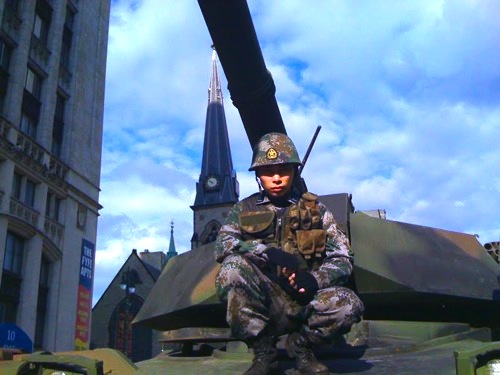
So in the interest of informing the public, we’ve decided to disclose what we saw in the original, ‘uncensored’ cut of MGM’s new Red Dawn – the version that featured the Communist Chinese as the villains.
—
The ‘uncensored’ version we saw of Red Dawn was a stirring, highly patriotic ode to America and its freedoms – the kind of film that until recently I didn’t think Hollywood could make any more.
The film opens with a series of title cards explaining how the United States has over-extended itself both militarily and financially, and put itself in deep economic debt. The upshot is that the Communist Chinese, eying America and its financial weakness, are ready to collect on this debt. The film’s brief, explanatory setup is chilling and effective, given current events.
We then cut to a high school football game in a suburb of Spokane, Washington where we first get to see the ‘Wolverines’ in action (as in the original John Milius film, the ‘Wolverines’ here are the mascot of the local high school). Whereas most films featuring high school football never really capture the speed, violence and chaos of the game, this opening sequence really depicts all that nicely and feels realistic. It’s a small point, but it’s important – because it sets the mood for the intense guerilla action to come.
The film’s two central characters are introduced in this sequence: Matt Eckert, played by Josh Peck, and his brother Jed Eckert, played by Thor‘s Chris Hemsworth. Jed is an Iraq War vet, recently back from deployment; he’s shown up unexpectedly to watch his younger brother quarterback the Wolverines. The two brothers have an easy rapport, but there’s still some underlying tension there, as there usually is among brothers. Is it just that Matt wears his hair too long, and seems a little on the soft side in comparison to Jed? We don’t know yet, but we learn more about the true source of that tension as the story unfolds.
After the game, the brothers go out with their buddies to do what high school guys usually do after football games: get beers and girls. As this plays out, we get a slightly better feel for Chris Hemsworth’s Jed – he’s brooding and intense, and has a difficult time unwinding. Recently back from fighting overseas, it’s not so easy for him to fall into the carefree world of high school partying anymore. He’s seen too much.

Red Dawn paints small town life here with swift, clean strokes. It took only a few minutes for me to feel like I knew these guys and what makes them tick. Their world, basically, is a world of trucks, chicks, strong personal loyalties and vague apprehensions for their future – the kind of world Springsteen has made a career singing about.
Their world is about to change, however, and abruptly. With no warning other than an ominous rumbling noise, and their house shaking, the Eckert boys and their compatriots wake up one morning to see Chinese paratroopers dropping out of the sky in a massive, thunderous air assault. It’s a genuinely frightening, gut-wrenching sight as transport planes disgorge an endless number of Chinese soldiers into the skies above this otherwise quaint town. At one point, an American missile hits one of the planes – and the plane’s fiery wreckage crashes right into one of the houses. Reality is suddenly hitting these teenagers in a big, 9/11-sized way.
This initial Chinese assault plays out almost entirely from the perspective of the teenagers, who are forced to grab anyone they can, hop in trucks, and race like hell out of town into the woods to a family cabin. The Chinese, who are landing vehicles, soldiers and command-and-control units, try to stop the Eckerts and their friends – but the kids successfully slip away.
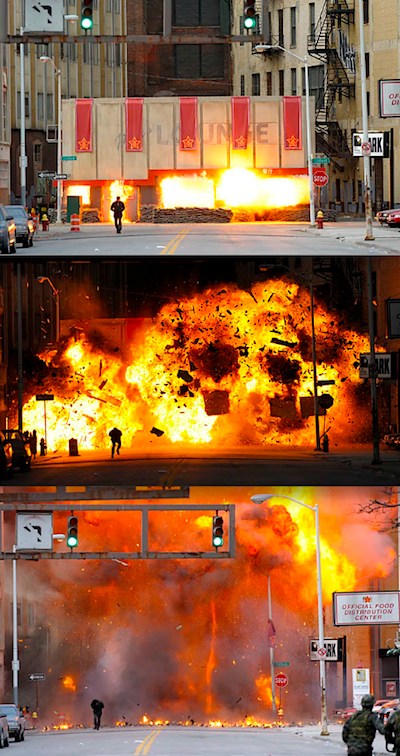
The kids regroup at the cabin, and begin to piece together what’s going on. Already there are news blackouts, and it’s not totally clear how successful the Chinese operation has been – or why it even happened. ***SPOILER WARNING*** We eventually learn that the Chinese have used advanced electromagnetic pulse weapons to disable our electronics and communications. Chinese systems are adapted to being immune to the pulse. We also learn that the Chinese are “here to collect” on the massive economic debt America owes them. ***END OF SPOILERS***
It’s at this point that Chris Hemsworth’s character, Jed, really begins to take over and assert his leadership – using skills honed during service in Iraq. He rallies and organizes the rag-tag group of teenagers under his ‘command’ – although immediately some of them don’t like him giving orders. Jed starts to chew people out and bring the hard lessons he’s learned during warfare to bear on the crisis.
What really gives the film credibility at this point – and sustains it throughout – is Chris Hemsworth playing Iraq War vet Jed Eckert. He is nothing short of sensational. If Thor doesn’t turn Hemsworth into a star, Red Dawn will. He conveys a rugged masculinity, a toughness of spirit, a middle America/Red State vibe you don’t really see anymore on-screen in the depiction of American teenage guys – all of whom have seemingly been turned into Michael Cera. Hemsworth is the glue that holds the film together.
Eventually the Chinese show up, dragging along the Eckert boys’ captured dad Tom, the town sheriff played by Brett Cullen. The Chinese military commander Captain Lo, played with icy menace by Will Yun Lee, threatens Tom – sensing that his boys are watching from somewhere out in the woods. Tom Eckert, for his part, is having none of it. He tells the boys not to give in to the Chinese, but to instead hunt them down and defeat them. (He says it a lot more picturesquely than that, actually, but Libertas tries to be a family-friendly site.)
***SPOILER WARNING*** With the kids only able to look on, helplessly, the Chinese Captain then murders their father in cold blood. ***END OF SPOILERS***
At this point, we already know everything we need to about what motivates the Eckert boys and their compatriots going forward. They’re going to fight for their home and for freedom, and they’re also going to be doing it for payback.
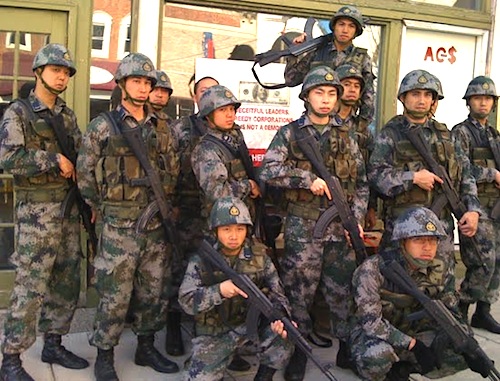
This theme of ‘fighting for your home,’ incidentally, is an important one for Red Dawn, because it serves to some extent as a source of tension between the brothers. It turns out that Matt is still angry at Jed for having enlisted in the military shortly after the death of their mother – and for remaining away so long fighting overseas. As much as war overseas has honed Jed into a formidable leader and fighter, it kept him away from his family at a crucial time. This is an important subtext of the film: specifically, that America has stretched itself too thin, and neglected to take care of its ‘home base,’ so to speak.
At this point we get a semi-obligatory sequence involving the military training of the Wolverines by Jed. This is probably the weakest link in the film. It’s difficult to imagine these teens as being adequate adversaries to the Chinese forces, in large measure because there doesn’t seem to be any way that a crash course in the woods could possibly get them prepared. In any case, we at least get to know some of the young kids a little better. Among them are Connor Cruise (Tom Cruise’s son), who plays ‘Daryl,’ and Jed’s love-interest ‘Toni’ played by Adrianne Palicki. The young cast acquits themselves honorably here.
In fact, the only problem I really had with anybody in the cast is actually with Josh Peck as Matt Eckert. Or maybe it’s just with his hair? Quarterbacks don’t wear their hair that long unless they’re Tom Brady.
But back to the story. The Wolverines head into the city to get a sense of the occupation, and to stir up trouble for the Chinese. Things are grim. The Chinese have put many Americans into internment camps, including Matt’s girlfriend Erica (played by the pretty Isabel Lucas, the robot hottie from Transformers 2) – and we learn that some Americans have even gone ‘turncoat’ and collaborated. Surprised? I wasn’t. I live in LA.

We start to get some of the film’s boffo action sequences here, as the kids race around town creating hell for the Chinese – stealing their weapons, blowing things up (there’s one especially delicious moment when a turncoat informer gets his comeuppance), and picking off the occupiers one by one. We finally get the signature moment when one of the guys – I think it’s Josh Peck – raises his machine gun from atop a rooftop and shouts: “Wolverines!” I was looking around for Charlie Sheen from the original film at this point, but he wasn’t there. (I guess nowadays he would’ve shouted: “Winning!”)
It’s important to point out here that the new Red Dawn is essentially an action picture rather than agitprop cinema. The film was directed by veteran stunt coordinator Dan Bradley, who worked on the Spider-Man and Bourne films. As a result, the film is much less philosophically or ideologically oriented than John Milius’ original film, as Bradley keeps the emphasis on action and a brisk pace.
That does not, in my opinion, make Bradley’s version the better film. In fact, I still prefer Milius’ original – which is much more ruminative, idiosyncratic and character-driven. Also: the Chinese in this new Red Dawn lack the signature hardware like the Soviet Hind helicopters from the original – making them somewhat less formidable – and we never get to know them as well as we do the Russians and the Cubans in the original.
One further note: at no point does the new Red Dawn descend to racist stereotypes. The Chinese are depicted essentially as cool-headed professionals on a mission.
The big action sequence in the middle of the film involves Matt’s ill-advised effort to rescue his girlfriend, Erica, during a rally orchestrated by the communist Chinese in the middle of town. With the Wolverines causing endless headaches for the occupation, and inspiring resistance efforts elsewhere, the Chinese decide to hold a big public spectacle in which they and their local political puppets – including the town mayor – encourage the population to co-operate. This scene has that icky, uncomfortable, Sorrow and the Pity feel that films depicting occupations always have – where nervous officials tell nervous citizens how everything will be OK if we just bow and smile to our new masters.
Ominously, a representative of the Russian Spetsnaz appears on the viewing stand, joining the Chinese brass and local officials. Uh-oh. The Chinese aren’t alone, it turns out. (Or perhaps the Russians were simply annoyed at being cut out of the remake?)

The Wolverines arrive in force to spoil the day for the Chinese, but Matt spots his cute blonde girlfriend being driven away in a prison bus. So in the midst of the Wolverines’ carefully planned guerrilla operation, he goes rogue and heads off to save her. I won’t reveal what happens, but some hard lessons end up getting learned as a result of his foolish, romantic gesture.
The Wolverines eventually run across some Marines who are looking for them. (One of them, interestingly, is himself Chinese-American.) This is a great little moment in the movie, because the Marines are really appreciative of what these half-trained kids have been doing. I must confess to finding this sequence quite touching; aside from getting ripe dialogue of the “Marines don’t die, they just go to hell and regroup” variety, you also are reminded of how mobilized, volunteer citizens can always make a difference – no matter what the cause. What else, after all, were the Tea Parties about?
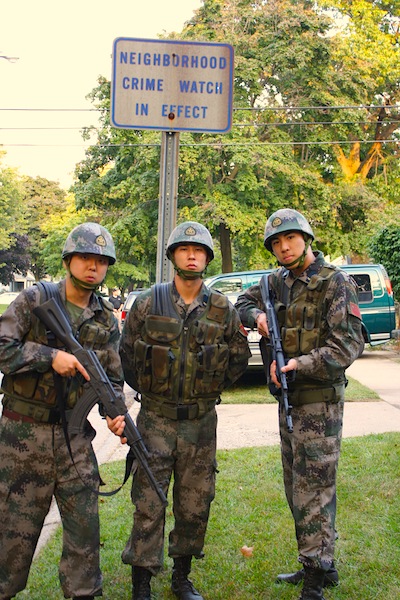
The Marines fill in the Wolverines about what’s been happening in the war. We learn about the Chinese using advanced electromagnetic weapons that knocked America’s military systems off-line, and that the West Coast folded quickly (of course!), and the East Coast, as well – except for Florida. There are also some delicious – albeit indirect – references to how resistance to the Chinese invasion seems stronger in the Red States, especially in the Heartland and in border states like Arizona and Texas. (It will be interesting to see whether these references are edited out by MGM’s new management.) And the Wolverines themselves, ironically, have been inspiring that resistance – without even knowing it.
The film then builds to its climactic action sequence as the Marines and the Wolverines mount an assault on a local police station that houses a device controlling the Chinese electromagnetic pulse weapon. This intense, gnarly action sequence – like something out of a Bond film – is easily the signature moment of the film, and is clearly where Dan Bradley shines as a director. (My favorite moment in the sequence, though, is when the Chinese-American Marine, mimicking the communist Chinese in order to distract them during the raid, chatters into a microphone: “The vicious rodents are attacking!”) The action here is 80s-old school, with blazing sub-machine guns, shattering glass, bone-crunching fights … and, eventually, payback for the Eckert boys who finally get their revenge.
The film isn’t over, however – nor is the Chinese occupation. The Spetsnaz intervene with some nasty consequences for the Wolverines, and the film concludes with the sense that the fight for America’s liberation has only just begun. Tellingly, the film ends with the Wolverines liberating an internment camp … built on the site of their own high school. The final image in the film is of the Wolverines charging into battle onto their own football field – the same one seen at the opening of the film – but now they carry an American flag, instead of school colors.
It’s a rousing conclusion – emotional and satisfying – and quite similar, actually, to the way the recent Battle: Los Angeles ends.
—
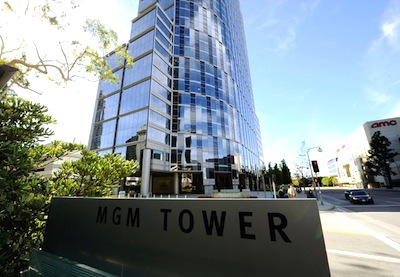
So that’s what we saw. It’s a shame that MGM is now going to tamper with it for political reasons – and turn the villains into the North Koreans, Guatemalans, Saskatchewans, or whoever else they have in mind. Hell, why not have the Oakland Raiders invade? I’d find that more believable than the starving, impoverished prison state of North Korea invading us right now.
Ironically, Red Dawn isn’t the only entertainment property coming out this year with this same basic storyline. John Milius’ own Homefront video game – which features a North Korean communist invasion of the American homeland – debuts this week. And there’s also the Australian film Tomorrow, When the War Began (based on the popular Australian novel series), which features teenagers fighting off an invasion of Australia by an unspecified Asiatic power. Tomorrow was a huge hit in Australia, a sequel is already in production, and Paramount has picked up international distribution rights to the original film.
Homefront, Tomorrow, When the War Began and the newly re-edited Red Dawn all, however, appear to be equivocating on the nature of the threat coming from China – a threat that courageous Chinese filmmakers like Zhao Liang and Huang Weikai have literally risked their lives to document. If only filmmakers in the West had their courage.
It’s important that America, and world audiences, not be deceived about the repressive, totalitarian nature of the communist regime in China. The ‘uncensored’ version of Red Dawn offers us a vivid warning about the Chinese government. We’re sorry to learn that MGM will now be participating in this general whitewashing of China’s regime, in order to preserve its corporate profits.
MGM’s profits here are coming at a very steep price for the rest of us: that of free speech.
[UPDATE: Special thanks to Lars Larson for having me on his radio show today, and also to Hot Air for linking to us. Also many thanks to our friend Patrick Goldstein of the LA Times for his article today on this piece, and also to Ted Johnson at Variety, Garth Franklin at Dark Horizons, and the folks at Indiewire/Playlist.]
[UPDATE 2: Special credit goes as well to the Red Dawn 2011 website and George Joseph for the terrific poster he designed and some of the behind the scenes photos in this story.]
Posted on March 17th, 2011 at 8:34am.
Wow, hearing the actual story, the changes they made become even less believable. Maybe I was purposefully boycotting myself from detailed information about Red Dawn, but I thought the Chinese merely invaded because we were weakened and decided to take advantage of the situation to become the only clear superpower of the world. The fact that they were collecting on our debt makes the scenario seem so much more plausible. Now, taking China out and replacing it with North Korea, it takes so much of the believability out of the equation. I thought Homefront had the most believable North Korea invasion story and even that was mostly unbelievable.
Also, Homefront originally had China as the main antagonists also, but they too were replaced by North Korea because of the assumed backlash from their government.
What they’re doing is undoubtedly hurting the credibility of the story – which, in its original form, was actually even more believable than the storyline of the original 80s version.
Honestly, I don’t even understand the decision from a business aspect. The move makes the movie somewhat of a joke that probably won’t sell in either the US or China. Keeping the antagonists as China may lose you the entire Chinese market, but if it makes for a better movie, America will support it and you will probably make more than the neutered version could in both territories. I guess MGM could be worried that Red Dawn could lead to Red China banning future MGM movies, but from the perspective of this single movie, the move would seemingly hurt the business aspect.
Exactly. This is being done to preserve other films down the line. The strong impression I have is that they’re sacrificing this film for the benefit of the Bond and Hobbit films to come.
Does this story even have credibility? Honestly? China invading us to “collect a debt?” I’m sure you realize that the United States is not the only country that owes China some money. Why wouldn’t China invade, say, Japan, for the debt Japan holds with China? I mean, if we’re going to talk credible, does it even make sense for China to invade America without going through Japan? Besides which, China has real grievances with Japan from 80 years ago. I think people forget that China really did appreciate our actions against the Japanese. I’m sure also that Russia has some debt with China. It would be much easier for China to collect on that debt than send all its forces across the Pacific Ocean to try and somehow occupy a heavily armed and well trained, well educated nation like the United States. For China to try and occupy the United States, it would weaken its home front to Russia and India, something the Chinese take vastly more seriously than the “debt” it feels it needs to collect from the Americans thousands of miles away.
This may be good old fashioned Tea Party Porn, but don’t kid yourself that this is something credible.
Let’s keep in mind, Dan, that this is a movie – a brand name action thriller – rather than a documentary. The threshold of credibility that a movie of this kind needs to reach is a bit different than what, say, a Ken Burns would need were he making a documentary on U.S.-China relations.
no doubt, Jason. When heading to the theater to be entertained, we’re obviously leaving reality behind. My point was that the premise is highly laughable even in a fictional world. I guess I missed what the point of this film was, or what the target audience was. But then again, it is always tough to realistically conceive of another nation on this planet invading America. Our two great oceans are such wonderful defenses. The original Red Dawn had a relatively plausible scenario: the Soviets controlling Central America from which they launch their invasion of America. That scenario has some credibility to it. China choosing to invade America to collect on a debt has far too many plot holes in it to be credible or plausible. Such incredulity may work well for a kid’s tv show like Pokemon, but it shouldn’t be the kind of entertainment educated adults find amusing or entertaining. I don’t know, I guess to each his own. But if I were a conservative, I would feel embarrassed that this kind of hokey storyline represents my ideology.
That’s actually a very bizarre statement. How does an invasion from a foreign country represent either a liberal or conservative ideology? Easy answer: it doesn’t. The conservative aspect comes into play with the reaction of common, average, everyday small town folks banding together to fight an invading force. Now, if you want to argue that’s implausible, silly and lacks credibility, then you’d have a point about whether it’s wise to get behind it and reflect our ideology. But the fact that an invasion from any foreign power is not very plausible and kind of hokey says exactly zilch about the ideology of us conservatives.
but see, you’re suggesting that liberals would not react as “common, average, everyday small (or big) town folks banding together to fight an invading force.” Thus I ask you the same thing, how is that conservative? This movie is being lauded by conservatives as speaking what they feel. The original Red Dawn is adored by conservatives for portraying what they think and feel. It’s not a bizarre statement to say that this story represents conservative ideology.
It’s no hokier than Avatar was.
In any case, I actually think the key issue is more ‘motivation’ than the mechanics of an actual invasion – because you can basically poke holes in any of these scenarios (as our readers have been doing). I actually understood the motivation of the Chinese in this version of Red Dawn better than I understood the motivation of the Soviets in the original version – even though I prefer Milius’ film. It just seemed like the Russians were taking on a huge headache in that film, whereas the Chinese were looking to add us to their business portfolio, so to speak.
First off I am a Chinese, I just wanna say: pls pls don’t change the China vs US to Korean vs US!
if you think that change will make this movie pass the movie censor in China and go to Chinese theaters, that is too naive. All the news about N. Korea in China is closed-comment, the gov doesn’t want to people’s spit over N. Korean to be seen on Internet. So how can you expect they allow movie about NK vs US? you will waste your money!
Come on, how come Korean can fight to US mainland? the idea of Korean combat with US is boring! China has much more ways to play with US in the movie, nuke, submarine, economic, anti-sat missile, or even robots whatever. for N Korean, they only have the funny leader. Movie should be fun!
Moreover, believe me, there are millions of ways for Chinese people to watch the moive on Internet even it doesn’t hit the Chinese moive theater. And people has much less interest in N Korean vs US oversea
別改啊!!拜托
Oscar, many thanks! We’re pleased to have you as a reader, and your comment here has got to be my favorite yet!
I love your line about North Korea only having a “funny leader”! That’s priceless. Best wishes.
Great scoop, Jason.
My question is, why now? How did executives fail to see the screenplay before photography even began for this picture?
The only thing that bothers me is the censorship — and the bowing to a communist country. But I was never really on board with this concept to start — mostly due to China’s very limited history of expansionism and colonization.
I think the progressive movement, AFLCIO/SEIU and other collectivists, and Islamists are a far greater threat to the nation than the Chinese, but that’s all a little off topic.
Although I haven’t seen the film, I still like that you said it’s a cautionary tale on China, because I wouldn’t dismiss the country as a threat. I’m also glad to hear that the film remains true to the theme of home defense, the civilian’s role in it, and the genius of the Second Amendment — that’s where Red Dawn’s value is, in my opinion.
Thanks for your remarks, Vince.
Bear in mind that there is a different group of executives running MGM right now. That’s a crucial factor here.
“I think the progressive movement, AFLCIO/SEIU and other collectivists, and Islamists are a far greater threat to the nation than the Chinese, but that’s all a little off topic.”
lolol
conservatives are hilarious. not to mention incompetent at politics and directing movies. stick to being funny on the internet.
‘Incompetent’ at directing movies? So I guess you would consider, say, Howard Hawks incompetent? Or Victor Fleming? Or perhaps Cecil B. DeMille – surely the most ‘incompetent’ of them all.
Wouldn’t bark up that tree if I were you.
Actually, Communist China invading the US is quite a bit more of a historical stretch than, say, electing a cyprto communist President with super majorities in congress – declaring a fiscal emergency, appointing two additional hard left SCOTUS judges thereby packing the court, changing the election laws such that all election functions are unionized and run by an ACORN like entity, implementing PC officers for each unit to keep the domestic military in line (most of the fighting units would be stranded in Iraq and Afganistan) and then, just prior to “amending” the constitution, importing 500,000 Korean “volunteers” to “keep order”.
I’d pay to see a movie based on that premise.
Who would you cast?
Any way we can contact MGM directly and let them know we’d like the see the film without all the reedits? Who’s going to want to see this with the North Koreans as the villains? That makes no sense.
I’m not sure what contacting them would do at this point. In any case, it appears that the film is being ‘sacrificed’ in order to preserve other MGM properties down the line.
Wow, that is one hot story line!
We aim to please, Patricia.
Excellent article and pictures I’ve linked to on my blog.
I hope it goes VIRAL!
Indeed, COMMUNIST (and don’t you forget it!) China is America’s most dangerous foreign enemy, WOLVERINES!
Thanks for the great retelling of the movie as originally filmed. Too bad we won’t get to see it as originally scripted.
As to the rewrite, could it work if the basic reason for the invasion was maintained, and the NorKs were essentially being used as mercenaries by the Chinese? Sort-of paid “collectors” for the debt, using Chinese tech and equipment?
My understand from what I’m hearing behind the scenes is that they’re changing it to being a ‘coalition’ of communist countries. What such a ‘coalition’ would be without Chinese involvement – and leadership – is anybody’s guess.
The studios aren’t bowing to the Chinese on political grounds.
Someone had a ‘duh’ moment, or week, when they greenlighted this movie without taking into consideration the overseas market. The Chinese have money and they’re not going to pay it to see themselves portrayed as baddies. No one considers themselves the bad guys.
The North Koreans, on the other hand, are considered crazy by both the Americans and Chinese, plus the Norks don’t have any money. The distribution in Pyongyang is limited to one copy for ‘Dear Leader’ but the Asian market is huge.
As I stated in the article, this is basically happening due to pressure from potential distributors. The sad thing is that the Chinese themselves need hardly get involved.
IMHO the Chinese should be the protagonists in this film. I will be rooting for the liberators either way, whether they are depicted as North Korean or Chinese.
Jar Jar, didn’t you vote for the creation of the Grand Army of the Republic? Shame on you!
Being from the guy who did the stunts on Bourne and second unit for Quantum of Solace how much jitter cam and, more importantly, rapid cutting can we expect, if any.
There’s a fair bit of all that – but not so much as to make the sequences unenjoyable, or difficult to comprehend.
As someone who knew folks at the previous MGM regime, this is an unfortunate and all-too-commonplace way of “cleaning house” of your predecessor’s projects. CABIN IN THE WOODS — which was supposed to have been released January 2010 — is still in limbo as well (the last of the MGM movies to be produced, THE ZOOKEEPER, is being distributed by Sony). The people at Spyglass are short-timers who don’t really care about making a name for themselves; they’re in it for the quick cash and, as you mentioned, putting all their cards on attaching themselves to the next Bond film and THE HOBBIT (which doesn’t make much sense as they’ve sold off most of their distribution rights to the latter).
Interesting insights, John. My sense is that this one is probably going to backfire on them, however. The reaction I’ve seen across the media to their re-editing has been resoundingly negative.
Just speculating a little, but perhaps the filmmakers could have made the Chinese invaders into a hardline Marxist contingent that had re-taken control of China and made the movie even more of an Anti-Communist,anti-socialist statement. That may have made the American left even more angry. That said, we definitely need more Pro-American, Pro-Western movies that aren’t afraid to wear their patriotism on their sleeve. I love the old WW II movies.
Let me tell you, this is truly a case of fumbling the ball on the goal line. They already had a strong film in the can. All they needed to do was release it.
Vince says ” mostly due to China’s very limited history of expansionism and colonization”.
I wouldn’t tell that to the Vietnamese, Cambodians, Tibetans, Mongolians, and other South East Asian cultures that have at one time or another been dominated, invaded, or occupied by the Chinese in the present or historically.
Excellent point, but so much of that happened too long ago to be really relevant in my point.
Vietnam is obviously the exception, but I didn’t use it as an example because they got beaten so badly there. I just don’t think modern China has serious expansionist goals, or the will to do it.
“[…] We eventually learn that the Chinese have used advanced electromagnetic pulse weapons to disable our electronics and communications. Chinese systems are adapted to being immune to the pulse. We also learn that the Chinese are ‘here to collect’ on the massive economic debt America owes them.”
Anything with this much of a brain-dead premise deserves to be shelved, not digitally tarted up or re-edited. Even assuming that such EMP weapons could be created on a continental scale (which is dubious), let alone deployed across the Pacific, they would take out entire geographic swaths of a country, not just military systems.
The Chinese (Koreans, whoever) are both destroying and wanting to “collect” from the same economy? They are NOT stupid! God’s teeth, who comes up with these imbecilic plots?
What I wonder is, first, how they’re managing to spend “only” $45 million on it, and how they can justify adding to the sunk costs by an impossible attempt at redubbing / re-SFX-ing it. Second, why they’re bothering to remake it in the first place. And third, for decades now, what anyone saw as worthwhile in Milius’s original. (He did notably better scripting Spielberg’s “1941” — unline “Red Dawn,” that was an *intentional* war satire.)
One quick point here, Greybird: as I recall, these EMPs are not ‘continental’ in scale, but operate within a smaller radius. But I won’t argue the science of the matter, because I’m not familiar with it.
A single nuclear device exploded at an appropriate altitude above the
continental United States could possibly affect our industrial capacity, economic
stability, and military effectiveness.
From Congressional Research Service report “High Altitude Electromagnetic Pulse (HEMP) and
High Power Microwave (HPM) Devices:
Threat Assessments”
http://www.fas.org/man/crs/RL32544.pdf
I never really get why people hate the premises for these movies so much. I mean, if you don’t think it’s executed very well, fine, but the premise isn’t supposed to be believable in the first place, just faintly plausible. Of course neither Russia or China has ever had any serious plans to invade the entire US, nor would they have the manpower to base large contingents of soldiers in small mountain towns. That’s not the point. It’s unrealistic for aliens to invade, too, but no one ever gets angry about that premise. The point is to put American small towns and young people into a situation they would never really have to face to examine how they would react. Other places around the world are invaded and occupied by foreign powers. Some of them have strong local resistance, some do not. The Red Dawn films’ premises is that Americans would build a strong resistance, but it would not be simple or easy, and the point of the story is to both examine how it would happen, and have fun blowing a lot of crap up. People complaining the plot is stupid just miss the point.
Note: That comment is directed at other commenters and critics, not this article. The idea that the North Koreans could lead the invasion just comes off as stupid, not an interesting hypothetical dealing with a real superpower, and, a much bigger issue, the whole caving-in for political whitewashing is completely shameful. It is racist, it is cowardly, and I am quite disgusted with the whole thing. Say what you will about MIlius, at least he had balls,
Very well put, Stephen, on all points. Thanks for your contribution.
Jason, isn’t this the “smoking gun” for why American film makers make anti-American films?
Isn’t this the perfect technique for undermining the country – by setting us up for subsidizing our own anti-US propaganda arm?
Isn’t it time to start taxing films overseas profits at a higher rate than money derived from US audiences?
Hey, we need the money!
K, you’re absolutely correct that there is an ideological consequence to Hollywood’s growing reliance on the foreign market. Years ago I actually wrote a column for Townhall on this subject called “Why Hollywood No Longer Needs the Red States.” The article seems to be buried somewhere in the Townhall archives, but the title alone should give you the drift. When your ‘audience’ is now as much France, Poland, Russia and China as it is Ames, Iowa, you can expect movies to take on a much different tenor.
How about republishing your article here? I would be interested in reading it and it seems rather timely.
Thanks
It would be a bit out of date right now, but I’ll see if I can find it. That was several laptops ago.
Any chance of a pirate copy of the original CHICOM bad guy Red Dawn making its way out of the back door and to DVD?
I bet the Chinese would do it…They usually ignore copyrights – if the bribe was high enough
The whole censorship issue is sad very sad. I hope a clean copy becomes available. The entertainment value for me is probably only so so, do to the scenario.
OK so I guess I am supposed to find it plausible that our missile subs etc were taken out by EMP, or that there was a simultaneous strike on all of them as well as our hardened missile silos etc? Suspending some common sense problems with the scenario, this might be an ok movie, but it is even less plausible than the first Red Dawn which was a good movie.
Not to mention the Chinese would need to have invested in a blue water invasion fleet, which they do not have. That fleet would be a shooting gallery for any land based aircraft, and much of what we have is EMP resistant or in shielded ares for maintenance etc at any point in time. The old Confederate Air Force would almost be an issue for the PRC on our soil, but the CAF has had to change it’s name due to pc reasons as well.
Yes, those are all rather imposing problems aren’t they? Especially when it’s now the North Koreans attempting to overcome them. [Sigh.]
does chris hemsworths jedd still dies at the end? is that changed??
I’m trying not to be too spoilerific here. I said as much as I wanted to say about the plot.
Dan,
I didn’t mean that the story sounded entirely plausible, only that it sounded more plausible. North Korea is neither strong enough nor motivated enough to occupy the United States and that doesn’t look to change any time soon. China is a growing threat so their strength could be plausible in the future to occupy the US. And certainly you would agree that a collection of a debt is a lot more believable than just “Hey, America’s weak, let’s go toilet paper their country.” Again, not saying anything is plausible based on imminent conditions, but if you look at the movement of North Korea versus China, one is incredibly more plausible than the other.
Jason,
You have no argument from me over the hokieness of Avatar.
Maybe the premise comes across better through the film rather than a review of the film (not that you write a terrible review or anything). Though, as we see, the rest of us may never see the version you saw.
I think the virtue of the version we saw was actually that they didn’t spend too much time setting up the premise, and just let the audience’s imagination run wild a bit as to what the exact circumstances of the invasion were. The more detailed explanations came much later.
It’s interesting to have these discussions, but the reality is that in a theater you’re basically having emotional rather than intellectual reactions. What made the invasion in the film feel ‘real’ were the planes, the tanks, the endless hardware and banners – the physical presence of the Chinese forces, their professionalism, etc. It was well executed.